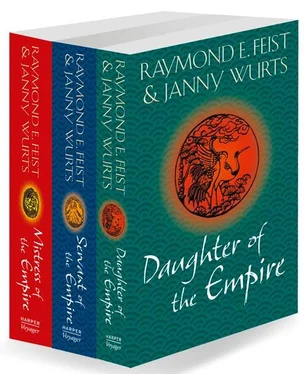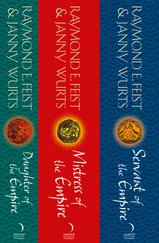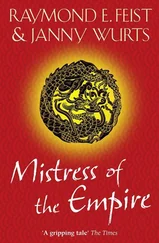Keyoke cleared a thorn branch from the path. ‘You speak as one who knows the cho-ja, Arakasi,’ he said.
The Spy Master avoided the branch as it swung. ‘No man knows the cho-ja. But I once hid from Minwanabi assassins for a week in a cho-ja hive. I learned something of them. It is my nature to ask many questions about things I do not understand when the opportunity presents itself.’
Mara was intrigued. Even when the ground became suitable for travel by litter once again, she remained afoot. ‘Tell me of the cho-ja, then, Arakasi. What are they like?’
‘The older ones are as ordered as the seasons, Lady. The young are unpredictable. They are hatched in a crèche. A dozen lesser females, called rirari, do nothing but lay eggs.’ The term was archaic Tsurani, meaning a second-level queen, or duchess. ‘But the eggs are infertile. The queen swallows them whole and passes them through a chamber in her body which fertilizes them, and more.’
‘More?’ asked Mara.
‘By some cho-ja means, as the queen is being serviced by a breeding male, she determines the sex and function of each egg, or leaves it sterile. At least, this is what I have been told.’
‘They can choose these things?’ wondered Mara. ‘Tell me more.’
‘Male cho-ja are roughly divided into three groups: the breeders, the workers and the soldiers. The workers are either clever or strong, artisans or beasts of burden, depending on what the hive needs. The soldiers are both strong and clever. The breeders are stupid, but they have only one task, to mate with the queen.’
Arakasi glanced aside and saw that Mara still listened raptly. A few of the nearest soldiers paid heed to the Spy Master as well. ‘Once the queen takes residence in the royal chamber, she never moves. Workers constantly feed her, while she is passed eggs by the rirari and serviced by the breeding males. Each one mates with her for hours at a time, until near exhaustion, when he is replaced by another. You will see when we are presented to the old queen.’
‘Fascinating.’ Mara paused, a little breathless, for the trail had grown steep once again. ‘What of the young?’
‘There is much I do not know of the females,’ Arakasi admitted. ‘But as immature cho-ja, all males are free to play and grow, much like human children – except that one day these young cho-ja are sporting about like needra calves and the next they awake, knowing their time to serve has begun. Only when a new queen is born are the soldiers hatched and hastened to maturity. This makes for an aggressive, unpredictable warrior, I’m afraid. They are quick to anger, and only the new queen can command them to instant obedience.’
Arakasi fell silent, for the trail crested a small rise, to cut sharply downwards into a valley tucked like a fold between hills. Through the arched boughs of a matched pair of ulo trees, they saw a sun-warmed meadow. The grass grew emerald, too meticulously clipped to be natural.
Arakasi pointed. ‘The hive lies ahead, beyond those trees.’
Keyoke commanded the soldiers to smarten up their columns. The company started forward in battle-ready array, with their Lady protected in their midst.
As her escort reached the edge of the ulo trees, Mara’s heart quickened with excitement. Through the raised shafts of the warriors’ spears she glimpsed the far end of the meadow, where a vast mound rose, ancient in that small trees had taken root and flourished upon it. An entrance was visible on one side, arches shored up with delicately carved stonework. On the beaten path that led inward, hundreds of cho-ja hurried to and from the hive, upon what errands only they knew.
Mara paused and commanded slaves to bring her litter. She might have been too excited to ride upon the ridge, but she would meet the cho-ja queens as Lady of a great house. As the bearers shouldered the litter poles once more, Keyoke and Arakasi marched at her side. Then all stood at readiness. One of the soldiers raised a battle horn to his lips and blew an announcement call. Then the Force Commander of the Acoma ordered Mara’s escort to step briskly from the shadow of the woods into sunlight.
Nothing changed at first. The cho-ja workers hustled about their tasks much as before, until the humans reached the valley floor. Then suddenly a dozen figures emerged from behind the right side of the hive. They raced forward like a herd of needra panicked by lightning, feet pounding upon the sod. ‘Warriors,’ Arakasi said. ‘Hold the men steady: this rush is probably a feint.’ Sweating slightly under his armour, Keyoke signalled the men. None readied weapons, though many might have questioned the prudence of the order, for the cho-ja bore down at a furious gallop. Closer they came, until the Acoma soldiers could see the sunlight gleam on the razor-sharp edges of their forearms. Then, when they were close enough to strike, the cho-ja veered off at the last second. With a sound like human laughter they ran off towards the hive.
Mara watched them go with a shuddering sigh of relief. ‘They are so swift. How did we ever manage to subdue them?’
Arakasi wiped his brow and returned an indulgent smile. ‘We never did, Lady. Humans settled land the cho-ja never wanted, until the queens found their hives surrounded. By then it was easier for both sides to make treaties than to fight. It takes skilled soldiers to face a force of cho-ja and survive. When aroused, they are efficient killers.’
As the retinue continued steadily towards the mound, more and more cho-ja appeared. Soon hundreds passed on every side, some with baskets strapped to their thoraxes, others wearing belts slung with tools. Aroused to curiosity by such industry, Mara peered through the curtain of her litter. ‘Arakasi, is this hive of normal size?’
‘A little larger than most, mistress, but not remarkably so.’
‘How many cho-ja live within?’
Without hesitation, Arakasi replied, ‘Twenty, twenty-five thousand.’
Mara was stunned. Before her lay a city in the wilderness. ‘How many will travel with the new queen?’
‘I don’t know. In the past, I think the hives would split when population pressure became too much.’ Arakasi shrugged. ‘Now there is little apparent logic in the decision to birth a new queen. For, despite their breeding continuously, the cho-ja control the hive’s numbers. Perhaps the old queen must reproduce herself each generation. Perhaps it is chance that brings a new queen. I do not know.’
Close at hand the mound seemed a symmetrical, steep-sided hill. The soldiers tightened formation, for the roadway became crowded. Here the grass had worn away to fine dust continually stirred by busy feet. Several times Mara’s party was approached by bands of young cho-ja. They pointed and stared with metallic eyes and chirped lively phrases in their own tongue, but the adults paid the visitors little heed. A band of workers scuttled past, carrying bundles of wood large enough to require five humans to lift, yet one cho-ja worker was sufficient for the task.
Then a band of young warriors came racing towards Mara’s party. Workers scattered from their path, bundles swaying, and jaws clacking a strange signal of dismay. Within a matter of moments the Tsurani found themselves surrounded. Keyoke called a halt. Dust swirled, and spear butts struck the earth in the formal stance of soldiers at rest, though the cho-ja appeared ready to fight. None was armed or helmeted in the manner of the guards upon the ridge. But with their powerful, naturally armoured bodies and razor-sharp forearm ridges, they would still make fearsome opponents.
Arakasi remained in position by the litter as Keyoke hastened forward. The Force Commander had barely reached the head of the column when a cho-ja charged. With the uncanny ability of his race to go from frenetic movement to absolute stillness, he halted scant inches before Keyoke, then stood there trembling, as if eager to fight. Yet when the cho-ja made no further provocative moves, Keyoke bowed with cautious courtesy. ‘We are of the Acoma,’ he announced. ‘My Lady of the Acoma wishes to speak with your queen.’
Читать дальше












